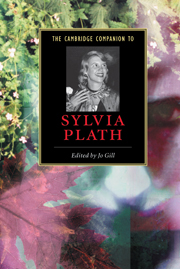5 - Plath and contemporary British poetry
from Part I - Contexts and issues
Published online by Cambridge University Press: 28 August 2006
Summary
Tradition
Sylvia Plath has been lionized by a host of scholars and critics, by successive generations of poets and by an enormous readership. Her voice resonates insistently through postwar twentieth-century British poetics. As Ruth Padel observes, crisply, 'Plath . . . is a permanent influence'.
Sylvia Plath and Ted Hughes were married in June 1956. Arguably, the ceremony set in train the sequence of events which would propel Plath into the critical limelight on both sides of the Atlantic. It now seems ironic that 1956, treated by Hughes as a 'watershed' in Plath's development (CP, pp. 13-17), also saw the publication of New Lines, the anthology edited by Robert Conquest which explained and enshrined the poetic practice of the so-called 'Movement'. This loose grouping of writers, Philip Larkin at its centre, has shadowed postwar British poetry ever since. It was their understated, self-consciously disciplined, 'academic-administrative verse, polite, knowledgeable, efficient, polished, and, in its quiet way, even intelligent' which Al Alvarez's anthology The New Poetry was openly intended to counter. Alvarez's decision to include Plath in the 1966 second edition did much to underwrite her existing reputation. Further, in ranging her - alongside names like John Berryman and Thom Gunn, Geoffrey Hill and of course Hughes - against what Alvarez dismissively calls the 'gentility' of postwar British poetry, the anthology constructed Plath's distinctive poetics as influentially radical. It still seems so nowadays. As Padel reminds us, 'Plath is deep inside most British poets today, both women and men. Not because she is a feminist icon, but because of her poetic brilliance: extraordinary linguistic control, wit, imagery and risk; how her poems move, laughter in the face of despair' (52 Ways, p. 44).
- Type
- Chapter
- Information
- The Cambridge Companion to Sylvia Plath , pp. 63 - 70Publisher: Cambridge University PressPrint publication year: 2006



